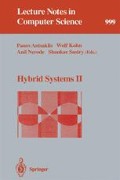Abstract
This contribution addresses the following hybrid control problem: A continuous plant is to be controlled via symbolic, or quantized, measurement and control signals. Quantization levels may be arbitrarily coarse (e.g. “temperature is too high”, “ok” or “too low”, “valve open” or “closed”). Sensor quantization is assumed to partition the plant output space into a finite number of rectilinear cells, each of which is associated with a unique measurement symbol. Measurement symbols are processed by a control algorithm, which generates a control signal with finite range, i.e. a symbolic signal. The latter determines the evolution of the plant state in time. Interaction between plant and controller is modeled by an interrupt structure, where information exchange is represented by sequences of timed (measurement and control) events. It is shown that, if certain observability conditions hold, the continuous plant state can be reconstructed from a sequence of measurement events. Likewise, if certain controllability/reachability conditions hold, the plant state can be transferred to any desired point in IRn by applying a suitable sequence of control events. These results are used in a heuristic Certainty Equivalence feedback scheme reminiscent of “receding horizon” strategies.
The author wishes to acknowledge support by “Deutsche Forschungsgemeinschaft” through Grant Ra 516-1. Part of this work was done while the author was visiting the Department of Electrical and Computer Engineering at the University of Toronto.
Preview
Unable to display preview. Download preview PDF.
References
P. J. Antsaklis, J. A. Stiver, and M. Lemmon. Hybrid system modelling and autonomous control systems. In R. L. Grossman, A. Nerode, A. P. Ravn, and H. Rischel, editors. Hybrid Systems, Lecture Notes in Computer Science 736, pages 366–392. Springer, Berlin, 1993.
V. Boltyanski. Mathematical Methods of Optimal Control. Holt, Rinehart and Winston, New York, 1971.
R. F. Brammer. Controllability in linear autonomous systems with positive controllers. SIAM J. Control, 10:339–353, 1972.
R. L. Grossman, A. Nerode, A. P. Ravn, and H. Rischel, editors. Hybrid Systems, Lecture Notes in Computer Science 736, Springer, Berlin, 1993.
W. Hahn. Stability of Motion, Berlin, 1967. Springer.
T. Kailath. Linear Systems. Prentice-Hall, Englewood Cliffs, N. J., 1980.
S. S. Keerthi and E. G. Gilbert. Moving-horizon approximations for a general class of optimal nonlinear infinite-horizon discrete-time systems. In Proc. 20th Annual Conf. Inform. Sci. Syst., pages 301–306, 1986.
J. B. Lasserre. Reachable, controllable sets and stabilizing control of constrained linear systems. Automatica, 29:531–536, 1993.
J. N. Lin. Determination of reachable set for a linear discrete system. IEEE Transactions on Automatic Control, 15:339–342, 1970.
J. Lunze. Ein Ansatz zur qualitativen Modellierung und Regelung dynamischer Systeme. at — Automatisierungstechnik, 41:451–460, 1993.
J. Lunze. Qualitative modelling of linear dynamical systems with quantized state measurements. Automatica, 30:417–431, 1994.
D. Q. Mayne and H. Michalska. Receding horizon control of nonlinear systems. IEEE Transactions on Automatic Control, 35:814–824, 1990.
J. Raisch. Simple hybrid control systems — continuous FDLTI plants with symbolic measurements and quantized control inputs. In G. Cohen and J.-P. Quadrat, editors, 11th International Conference on Analysis and Optimization of Systems, Lecture Notes in Control and Information Sciences 199, pages 369–376. Springer, 1994.
J. Raisch. Simple hybrid control systems — continuous FDLTI plants with quantized control inputs and measurements. Systems Control Group Report 9305, Dept. of Electrical and Computer Engineering, University of Toronto, May 1993.
J. Raisch and S. D. O'Young. A discrete-time framework for control of hybrid systems. In Proc. 1994 Hong Kong International Workshop on New Directions of Control and Manufacturing, pages 34–40, 1994.
J. Raisch and S. D. O'Young. Symbolic control of uncertain hybrid systems. In Proc. European Control Conference ECC95, 1995.
W. E. Schmitendorf and B. R. Barmish. Null controllability of linear systems with constrained controls. SIAM J. Control and Optimization, 18:327–345, 1980.
E. D. Sontag. Mathematical Control Theory. Springer-Verlag, Berlin, 1990.
J. A. Stiver and P. J. Antsaklis. On the controllability of hybrid control systems. In Proc. 32th IEEE Conference on Decision and Control, 1993.
Author information
Authors and Affiliations
Editor information
Rights and permissions
Copyright information
© 1995 Springer-Verlag Berlin Heidelberg
About this paper
Cite this paper
Raisch, J. (1995). Control of continuous plants by symbolic output feedback. In: Antsaklis, P., Kohn, W., Nerode, A., Sastry, S. (eds) Hybrid Systems II. HS 1994. Lecture Notes in Computer Science, vol 999. Springer, Berlin, Heidelberg. https://doi.org/10.1007/3-540-60472-3_19
Download citation
DOI: https://doi.org/10.1007/3-540-60472-3_19
Published:
Publisher Name: Springer, Berlin, Heidelberg
Print ISBN: 978-3-540-60472-3
Online ISBN: 978-3-540-47519-4
eBook Packages: Springer Book Archive

